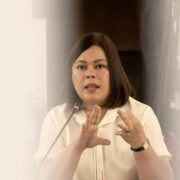Business leaders speak out as corruption cripples the economy

Corruption in the Philippines isn’t just a political problem; it’s also economic and the numbers are damning.
The country ranks 114th out of 180 in Transparency International’s Corruption Perceptions Index, with a score of 33/100, far below the Asia Pacific average of 44. Compare that to Singapore (ranked third, score: 84) or Malaysia (57th, score: 50).
Executive Secretary Ralph Recto had earlier said corruption in flood control infrastructure alone has cost P42.3 to P118.5 billion over two years. Recto estimates that without this leakage, GDP growth could have hit 6 percent, instead of 5.6 percent.
The IMF estimates that reducing corruption to Singaporean levels could raise the Philippines’ investment-to-GDP ratio by 6.6 percentage points and boost annual per capita GDP growth by 1.65 percent.
In a joint statement, 30 of the country’s largest business groups, including the Philippine Chamber of Commerce and Industry and the Management Association of the Philippines, condemned corruption as “shameful, unabated, continuing, and excessive.” They called it a “crime against our people” and demanded independent investigations, asset recovery, and institutional reform.
The Employers Confederation of the Philippines and the Philippine Exporters Confederation urged President Marcos to “firmly and fearlessly lead from the front,” warning that corruption is costing jobs, investments, and public trust.
Look at Singapore, where the Corrupt Practices Investigation Bureau operates independently and can initiate investigations without waiting for complaints. Its laws presume guilt for unexplained wealth—shifting the burden of proof to the accused. Indonesia’s Komisi Pemberantasan Korupsi pioneered anticorruption courts and whistleblower protections, while Malaysia’s Association of Corporate Counsel uses blockchain and artificial intelligence to monitor financial flows, leading to high-profile arrests and improved public trust.
The Philippines must follow suit. Build an accountability ecosystem—a coordinated strategy that treats corruption as a structural market failure.
Start with radical transparency: require beneficial ownership disclosure for government contractors and repeal the bank secrecy law, which shields illicit wealth.
Invest in institutional capacity. Quadruple the budget of the Office of the Ombudsman and double that of the Sandiganbayan. These agencies are tasked with prosecuting high-level graft but operate with budgets that wouldn’t cover a mid-sized compliance department.
Prevention is equally critical. A well-resourced Commission on Elections can vet candidates before they enter office. A modernized Commission on Audit can use data analytics to flag fraud before it happens, while a stronger Civil Service Commission can professionalize the bureaucracy, reducing petty corruption and improving service delivery.
The return on investment from a functioning accountability system is immense—not just in saved public funds, but in a more stable, predictable business environment.
MANNY ILAO,
manny.ilao@yahoo.com

















